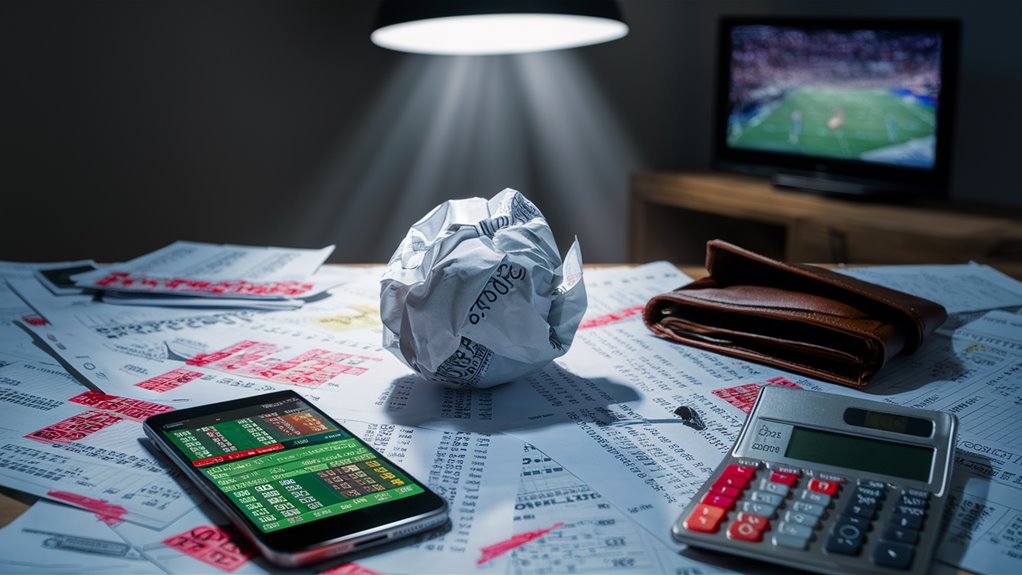
Big Errors New Sports Bettors Make: Your Must-Know Guide

Mistakes to Keep Away From When Betting
Poor handling of your betting funds is the top error by new bettors. Studies show that having a set budget for bets and keeping bets at 1-3% of your total funds helps keep betting stable over time.
Betting with emotions and trying to win back losses are risky moves that ruin betting balances. Reports state that 67% of gamblers with problems raise their bets by 50-75% when they are losing, trapping them in a harmful cycle of bigger losses. 온카스터디 인증리스트 추천
Big Strategy Mistakes
Not shopping for the best odds
Not checking different sportsbooks for better odds costs bettors 20-30% in possible earnings. Good sports investors always check several places to find the best betting value.
Following unproven betting tips
Chasing hot, unverified tips leads to shaky outcomes. Expert bettors rely on a deep analysis of stats, team behaviors, and past game performance, rather than following random advice.
Betting too much
Data shows 42% higher losses happen when making 10+ bets each week. Good betting plans generally stick to 3-5 careful bets per week, letting enough time for proper research and analysis on each bet.
How to Protect Your Bets
Use these safety steps:
- Keep detailed records of your bets
- Do your homework before each bet
- Compare odds across different platforms
- Set firm limits on losses
- Stick to particular sports or leagues
- Build a steady betting method
Following these tips while staying away from bets based on feeling can lay a solid base for long-term success in sports betting. Careful fund management and smart bet picks greatly improve your chance of making money in the long run. Night for Your Wedding
Not Caring for Your Betting Budget
Mastering Fund Management in Sports Betting
The Big Issue with Bad Fund Management
Poor fund management is a huge blunder in sports betting.
New bettors often put too much of their betting cash on single bets, often more than 10% each time. This risky habit can fast lead to going broke when on a losing streak.
Using a Professional Fund Plan
Basics of a Unit-Based System
A strict unit-based method means only using 1-2% of your total funds per bet.
With a $1,000 fund, usual units should be $10-$20 per bet. This safe approach guards against big ups and downs and keeps you betting through tough times.
Evidence shows that even top sports bettors only win 52-55% of the time against the odds, showing why it’s key to watch your betting funds closely.
Advanced Ways to Manage Risk
Regular fund adjustments are key for a long win run. Make automatic cuts of 50% to your bet size after losing three times in a row.
Keep strong track systems to follow wins and losses closely. High-level fund management is closely tied to long-lasting profits in sports betting.
Principles for Managing Betting Risks
The root of winning at sports betting lies in a strategy focused on surviving.
Value keeping your funds safe over trying for big, risky wins. This careful method, added to detailed performance review, builds a plan for steady winning in competitive betting markets.
Betting With Your Heart
Betting With Your Heart: How to Manage Emotional Betting

Understanding Bias from Loving a Team
Sports betting needs cool, clear choosing, but many bettors fall for betting on teams they love.
This link adds a big bias that can badly affect betting success.
Evidence shows that those supporting their favourite teams think they will win more by 15-20%, which adds a big gap in their betting actions.
What Team Loyalty Does to Your Bets
Backing a team hard often makes bettors think they have special insight into how the team will perform.
This wrong belief makes them miss important clues such as:
- Injury news
- Bad matchups
- Poor performance trends
- Stats likely to get worse
Harder to Judge Rival Games
Betting on big rival games is even harder to get right.
The strong feelings about these games often lead to:
- Giving too much weight to past games
- Ignoring how the team is doing now
- Placing emotion over sharp analysis
Data-Driven Betting Choices
Math Method
Turn each betting chance into a clear game of chance. Focus on:
- Checking stats closely
- Watching how players are doing
- Studying old trends
- Paying attention to what makes each game different
Keeping Emotions in Check
When liking a team too much gets in the way of making smart picks, stepping back from betting might be the wisest move.
To really do well at sports betting you need:
- Emotion-free checking
- Smart, careful thinking about the odds
- Sticking to a good plan for your funds
Chasing After Losses
Understanding and Stopping the Hunt for Lost Money in Sports Betting
The Harmful Mindset of Chasing Losses
Chasing losses is a very bad pattern in sports betting, with studies showing that 67% of gamblers with issues fall into this trap.
When bettors face losses, they often make more risky bets to get back what they lost, leading to a major money downfall.
How Chasing Losses Messes With Your Betting Plan
The mind game of chasing losses pushes bettors to leave their careful betting plans and key safety steps.
Analysis shows that those chasing losses up their usual bet size by 50-75% more than their normal bets.
This move often leads to fast, careless choices and bets on sports they don’t know well.
Strong Ways to Stop This
Setting hard stop-loss limits:
- Keep a tight 1-2% limit of your funds on each bet
- Have clear daily and weekly limits for losses
- Watch your betting for signs you’re starting to chase losses
Time to Cool Off
Studies show that taking a 24-hour break after losses makes you 40% less likely to make a rash bet for quick cash back.
Smart sports betting needs solid fund control and keeping a cool head, not quick fix bets.
Not Looking for the Best Odds
Why You Must Shop for Good Odds in Sports Betting
The Hidden Cost of Skipping Odds Shopping
Odds shopping across different sportsbooks is key to a good strategy.
Those who don’t do this often lose 20-30% of possible money they could have won. Even little differences in odds can mean a lot over many bets.
Learning the Numbers
Think of this real example: An NFL game has the Patriots at -110 on one site, while another has them at -105. This 5-point change means risk






